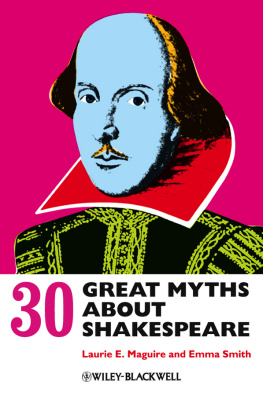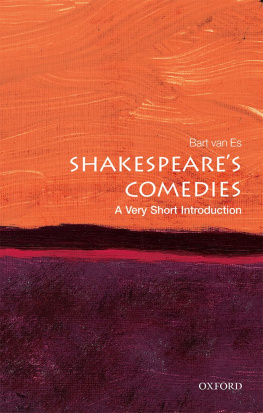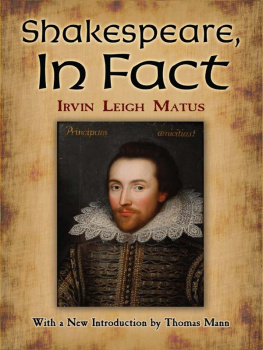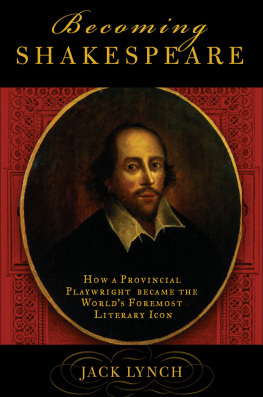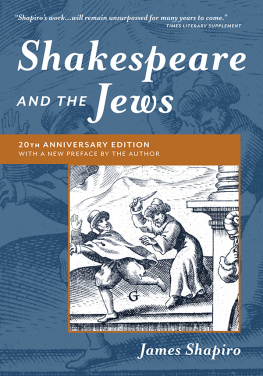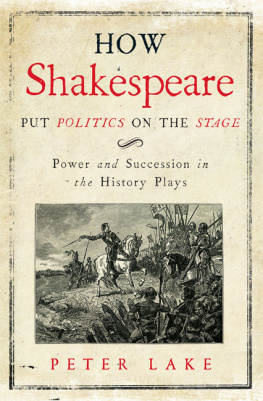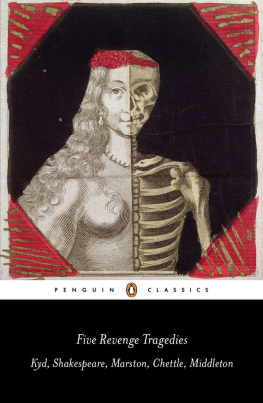
For Katherine Duncan-Jones
This edition first published 2013 2013 John Wiley & Sons Ltd
Wiley-Blackwell is an imprint of John Wiley & Sons, formed by the merger of Wiley's global Scientific, Technical and Medical business with Blackwell Publishing.
Registered Office
John Wiley & Sons Ltd, The Atrium, Southern Gate, Chichester, West Sussex, PO19 8SQ, UK
Editorial Offices
350 Main Street, Malden, MA 02148-5020, USA
9600 Garsington Road, Oxford, OX4 2DQ, UK
The Atrium, Southern Gate, Chichester, West Sussex, PO19 8SQ, UK
For details of our global editorial offices, for customer services, and for information about how to apply for permission to reuse the copyright material in this book please see our website at www.wiley.com/wiley-blackwell.
The right of Laurie Maguire and Emma Smith to be identified as the authors of this work has been asserted in accordance with the UK Copyright, Designs and Patents Act 1988.
All rights reserved. No part of this publication may be reproduced, stored in a retrieval system, or transmitted, in any form or by any means, electronic, mechanical, photocopying, recording or otherwise, except as permitted by the UK Copyright, Designs and Patents Act 1988, without the prior permission of the publisher.
Wiley also publishes its books in a variety of electronic formats. Some content that appears in print may not be available in electronic books.
Designations used by companies to distinguish their products are often claimed as trademarks. All brand names and product names used in this book are trade names, service marks, trademarks or registered trademarks of their respective owners. The publisher is not associated with any product or vendor mentioned in this book. This publication is designed to provide accurate and authoritative information in regard to the subject matter covered. It is sold on the understanding that the publisher is not engaged in rendering professional services. If professional advice or other expert assistance is required, the services of a competent professional should be sought.
Library of Congress Cataloging-in-Publication Data
Maguire, Laurie E.
30 great myths about Shakespeare / Laurie Maguire and Emma Smith.
p. cm.
Includes bibliographical references and index.
ISBN 978-0-470-65850-5 (hardback : alk. paper) ISBN 978-0-470-65851-2 (pbk. : alk. paper)
1. Shakespeare, William, 1564-1616 Criticism and interpretation. I. Smith, Emma (Emma Josephine) II. Title. III. Title: Thirty great myths about Shakespeare.
PR2976.M36 2013
822.33 dc23
2012026659
A catalogue record for this book is available from the British Library.
This memorial monument in the garden of the church of St. Mary the Virgin, Aldermanbury, London, is actually a double tribute. It commemorates Shakespeare and the two editors who collected his plays in the posthumous memorial volume of Comedies, Histories, & Tragedies (1623).
Photo: Col. Peter J. Durrant MBE.

Introduction
This book attempts to interrogate the things we think we know about Shakespeare, and we have called this body of knowledge myths. Why myths? We were drawn to this term for the Shakespeare content in each of our chapters because myth foregrounds the act of storytelling; because it underlines the cultural work these stories do rather than their accuracy; because it is not about a specific point of origin but about accepted beliefs; because it is about the people who accept or invent or need these stories as much as it is about the stories themselves. Not all of our myths are untrue: in calling these beliefs myths we are less interested in stigmatizing them as foolish or unsubstantiated than we are concerned to understand how they become ossified and block, rather than enable, our interpretation of Shakespeare's works.
Karen Armstrong's A Short History of Myth (2005) offers some pithy observations. Myths are dynamic: they change over time, they adapt themselves to cultural and historical developments, they have accretions and deletions, they iron outor accumulatecontradictions. Myths are not historically accurate: they do not work by being factual; they are interested in what an event meant, not in what actually happened; they are designed to be effective, not true. Myths provide explanations for something we might not otherwise be able to make sense of; they give us comfort. Myths serve different purposes at different times, being factored into a culture's national or religious or political history. And, she argues, humans are myth-seeking creatures. That is to say, we are creatures drawn to stories. Myth, from the Greek muthos, means something that is told, a speech, a narrative, a fiction, a plot. From here it comes to mean a set of beliefs (personal or collective).
Myths abound about Shakespeare in part because of half-remembered or out-of-date scholarship from schooldays, because Shakespeare the man is such an elusive and charismatic cultural property, and because interventions in Shakespeare studies, particularly biographical and theatrical ones, make headline news: witness the authorship question (Myth 30) or speculation about Shakespeare's beliefs or sexuality (Myths 7 and 18). Put simply, myths are told and retold about Shakespeare because no other writer matters as much to the world: nineteenth-century Germany had a flourishing academic Shakespeare criticism before England did; India had a Shakespeare Society before England; Shakespeare is regularly performed at amateur and professional levels, in translation, worldwide. Shakespeare is not just English (as Germany's unser [our] Shakespeare attests). Thus myths about Shakespeare go some way toward telling us stories about ourselves.
As Armstrong details, myths can be fictional and erroneousand many, but not all, of these Shakespeare myths arebut more often they turn out, in important and revealing ways, to follow two related definitions of the word myth from the Oxford English Dictionary. The first is
A traditional story, typically involving supernatural beings or forces, which embodies and provides an explanation, aetiology, or justification for something such as the early history of a society, a religious belief or ritual, or a natural phenomenon.
While Shakespeare is not quite a supernatural being, many of the myths we discuss explain or justify widely held, often unexamined, beliefs about art, authorship, and cultural value. The second relevant definition of myth is a popular conception of a person or thing which exaggerates or idealizes the truth. Many of our myths are just that: popular, often reiterated ideas which may have a basis in fact, but which over-emphasize the available evidence or speculate to fill in gaps in the documentary record. Often the honest answer to our questions about Shakespeare has to be that we are unsure: in place of that uncertainty, myths provide comforting and positive truths about the subject. In this book we try to peel our collective fingers from this comfort blanket, even though sometimes the unsettling outcome is that we know less than we thought we did.
This book arose from our interest in a related book in a different field: Fifty Great Myths of Popular Psychology (2009). The book includes such familiar propositions as: opposites attract; we use only 10 percent of our brain power; playing Mozart to babies boosts their intelligence; it's better to express anger than to hold it in. These are myths that have become traditional truths; in fact, they have attained proverbial status, as the epigrammatic chapter headings show. The book's subtitle,
Next page
